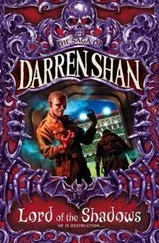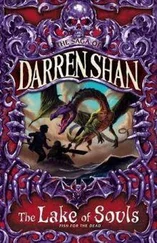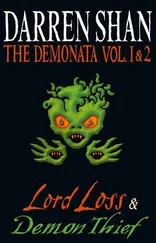Darren Shan - Lord Loss
Здесь есть возможность читать онлайн «Darren Shan - Lord Loss» — ознакомительный отрывок электронной книги совершенно бесплатно, а после прочтения отрывка купить полную версию. В некоторых случаях можно слушать аудио, скачать через торрент в формате fb2 и присутствует краткое содержание. Жанр: Ужасы и Мистика, Фэнтези, на английском языке. Описание произведения, (предисловие) а так же отзывы посетителей доступны на портале библиотеки ЛибКат.
- Название:Lord Loss
- Автор:
- Жанр:
- Год:неизвестен
- ISBN:нет данных
- Рейтинг книги:4 / 5. Голосов: 1
-
Избранное:Добавить в избранное
- Отзывы:
-
Ваша оценка:
- 80
- 1
- 2
- 3
- 4
- 5
Lord Loss: краткое содержание, описание и аннотация
Предлагаем к чтению аннотацию, описание, краткое содержание или предисловие (зависит от того, что написал сам автор книги «Lord Loss»). Если вы не нашли необходимую информацию о книге — напишите в комментариях, мы постараемся отыскать её.
Lord Loss — читать онлайн ознакомительный отрывок
Ниже представлен текст книги, разбитый по страницам. Система сохранения места последней прочитанной страницы, позволяет с удобством читать онлайн бесплатно книгу «Lord Loss», без необходимости каждый раз заново искать на чём Вы остановились. Поставьте закладку, и сможете в любой момент перейти на страницу, на которой закончили чтение.
Интервал:
Закладка:
“This place must have cost a fortune!” I gasp, standing close to the motorbike, staring at the house, almost afraid to venture any nearer.
“Not really,” Dervish says. “It was a wreck when I bought it. No roof or windows, the interior destroyed by exposure to the elements. The lower floor was used by a local farmer to house pigs. I lived in the brick extension for years while I restored the main building. I keep meaning to tear the extension down—I don’t use it any more, and it takes away from the main structure—but I never seem to get round to it.”
Dervish removes his helmet, helps me out of mine, then walks me around the outside of the house. He explains about the original architect and how much work he had to do to make the house habitable again, but I don’t listen very closely. I’m too busy assessing the mansion and the surrounding terrain—lots of open fields, sheep and cattle in some of them, a small forest to the west which runs all the way to Carcery Vale, no neighbouring houses that I can see.
“Do you live here alone?” I ask as we return to the front of the house.
“Pretty much,” Dervish says. “One farmer owns most of this land, and he’s opposed to over-development. He’s old. I guess his children will sell plots off when he dies. But for the last twenty years I’ve had all the peace and seclusion a man could wish for.”
“Doesn’t it get lonely?” I ask.
“No,” Dervish says. “I’m fairly solitary by nature. When I’m in need of company, it’s only a short stroll to the village. And I travel a lot—I’ve many friends around the globe.”
We stop at the giant front doors, a pair of them, like the entrance to a castle. No doorbell—just two chunky gargoyle-shaped knockers, which I eye apprehensively.
Dervish doesn’t open the doors. He’s studying me quietly.
“Have you lost the key?” I ask.
“We don’t have to enter,” he says. “I think you’ll grow to love this place after a while, but it’s a lot to take in at the start. If you’d prefer, you could stay in the brick extension—it’s an eyesore, but cosy inside. Or we can drive to the Vale and you can spend a few nights in a B&B until you get your bearings.”
It’s tempting. If the house is even half as spooky on the inside as it looks from out here, it’s going to be hard to adapt to. But if I don’t move in now, I’m sure the house will grow far creepier in my imagination than it can ever be in real life.
“Come on,” I grin weakly, lifting one of the gargoyle knockers and rapping loudly. “We look like a pair of idiots, standing out here. Let’s go in.”
Cold inside but brightly lit. No carpets—all tiles or stone floors—but many rugs and mats. No wallpaper—some of the walls are painted, others just natural stone. Chandeliers in the main hall and dining room. Wall-set lamps in the other rooms.
Bookcases everywhere, most of them filled. Chess boards too, in every room—Dervish must be as keen on chess as Mum and Dad. Ancient weapons hang from many of the walls—swords, axes, maces.
“For when the tax collector calls,” Dervish says solemnly, lifting down one of the larger swords. He swings it over his head and laughs.
“Can I try it?” I ask. He hands it to me. “Bloody hell!” It’s H-E-A-V-Y. I can lift it to thigh level but no higher. A quick reappraisal of Uncle Dervish—he looks wiry as a rat, but he must have hidden muscles under all the denim.
We meander through the downstairs rooms, Dervish explaining what each was used for in the past, pointing out items of special interest, such as a stuffed bear’s head which is more than two hundred years old, a cage where a live vulture was kept, rusty nails which were used by the Romans to crucify people.
There’s a large, empty fish tank in one of the main living rooms, set against a wall. Dervish pauses at it and taps the frame with his fingernails. “The last owner of this place—before it fell into ruin—was a tyrant called Lord Sheftree. He kept live piranhas in this tank. One day, a woman turned up with a baby—she claimed it was his, and she wanted money to pay for its upkeep.”
Dervish crouches down and stares into the abandoned aquarium, as though it’s still full of circling, multicoloured fish.
“Lord Sheftree invited her to stay for the night,” he says calmly. “While she was sleeping, he crept into her room and removed her baby. Brought it down here and fed it to the piranhas. Took the bones away and buried them. The woman raised almighty hell, but search parties couldn’t find a corpse, and nobody had seen her arrive with a child—so there was no proof she ever had one. She ranted and raved and was eventually locked away in a mental asylum. She hanged herself there.
“Years later, when Lord Sheftree was an old man and his mind was wandering, he boasted about the murder to one of his servants, and told her where the bones were buried. She dug them up and informed the police. They came to arrest him, but the local villagers got here first. He was discovered chopped up into tiny pieces—all of which had been dropped into the piranha tank.”
Dervish stops and I gaze at him in silent awe.
He stands and faces me. “I’m not saying this to scare you,” he smiles, “but this house has a long and bloody history. There are dozens of horror stories, none quite as gruesome as that one, but all of them pretty gut-churning. I think it’s best you hear about its past now, from me.”
“Is… is the house haunted?” I wheeze.
“No,” he answers seriously. “It’s safe. I wouldn’t have brought you here if it wasn’t. If the nightmares of the past prove too oppressive, you’re free to leave. But you’ve nothing to fear in the present.”
I nod slowly, thinking about Lord Sheftree and his piranha, wondering if I have the courage to spend the night in a house like this.
“Are you OK?” Dervish asks. “Would you like to step outside for fresh air?”
“I’m fine,” I mutter, turning my back on the fish tank, acting like I hear this sort of stuff all the time. “What’s upstairs?”
Mostly bedrooms on the first floor. All are fully fitted, the beds freshly made, though Dervish says only four or five of the rooms have been used since he renovated the mansion.
“Why bother with all the beds then?” I ask.
“If something’s worth doing, it’s worth doing right,” he laughs.
Some of the beds are four-posters, imported from foreign countries, with histories as old and macabre as the house. It’s only when Dervish is telling me about one particular bed, in which a French aristocrat hid for four months during the Revolution, that I think about how much they must have cost.
“What do you do ?” I ask my uncle. It sounds ridiculous, but I don’t recall Mum or Dad ever mentioning Dervish’s line of work.
“I dabble in antiques,” he says. “Rare books are my speciality—particularly books regarding the occult.”
Dervish looks at me questioningly—we haven’t mentioned demons since he picked me up at the institute. He’s offering me the chance to quiz him about them now. But I’m not ready to discuss Lord Loss or his minions yet.
“You must be good at it, to afford a place like this,” I say, sliding away from the larger questions and issues.
“It’s a hobby,” he demurs, leading me down a long corridor full of framed portraits and photographs. “The money’s good, but I don’t worry too much about it.”
“Then how do you pay for all this?” I ask nosily.
Dervish quickens his pace. I think he’s avoiding the question, but then he stops at one of the older portraits and points at it. “Recognise him?”
Читать дальшеИнтервал:
Закладка:
Похожие книги на «Lord Loss»
Представляем Вашему вниманию похожие книги на «Lord Loss» списком для выбора. Мы отобрали схожую по названию и смыслу литературу в надежде предоставить читателям больше вариантов отыскать новые, интересные, ещё непрочитанные произведения.
Обсуждение, отзывы о книге «Lord Loss» и просто собственные мнения читателей. Оставьте ваши комментарии, напишите, что Вы думаете о произведении, его смысле или главных героях. Укажите что конкретно понравилось, а что нет, и почему Вы так считаете.



